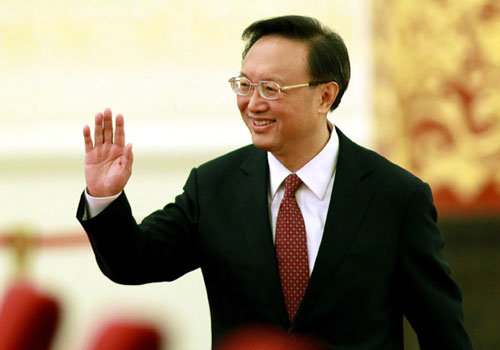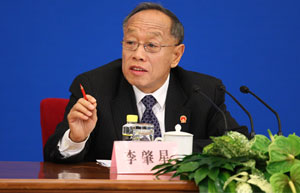'Good atmosphere' in ties
By Wu Jiao and Cheng Guangjin (China Daily)
Updated: 2011-03-08 07:53
Yang praises Sino-US relations but warns Washington on arms sales
 |
|
Foreign Minister Yang Jiechi arrives for a news conference during the ongoing annual session of the National People’s Congress in Beijing on Monday. [Photo/China Daily] |
BEIJING - Foreign Minister Yang Jiechi gave a positive assessment of Sino-US relations on Monday, saying that the "atmosphere at the moment is good".
Yang made the remarks during a news conference held on the sidelines of the annual session of the National People's Congress, the top legislature.
He even went into details of the "full agenda" for the world's two largest economies to develop relations in the coming months.
| ||||
However, Yang also warned that the US risks improved relations with China if it sells more arms to Taiwan.
"We urge the United States to ... stop selling arms to Taiwan and take concrete action to support the peaceful development of cross-Straits relations," he said. "This is critically important in protecting the overall state of China-US relations."
He urged the US to strictly abide by the three Sino-US joint communiqus and stop the arms sales.
Sino-US relations soured early last year after Washington announced a $6.4 billion arms sale to Taiwan, followed by a meeting between US President Barack Obama and the Dalai Lama at the White House.
However, during President Hu Jintao's state visit to the US in January, the two leaders agreed to "work together to build a cooperative partnership" and signed trade deals worth billions of dollars.
"The presidents of the two countries have charted the course for the development of China-US relations," Yang said. "What we need to do now is to seize the momentum and build on the progress."
Analysts said Yang's comments underscored Beijing's hopes for steadier ties with Washington after some rough patches last year.
Yet, as some long-standing hurdles still exist, both sides should manage their differences rationally to prevent an escalation that harms ties, they said.
Yang admitted "it is an objective reality that China and the US have some differences or even friction over some issues".
"What's important is to properly handle these differences on the basis of mutual respect," said Yang.
Sun Zhe, director of the Center for US-China Relations at Tsinghua University, said overall relations are moving forward, but a critical moment looms as the US prepares a new round of arms sales to Taiwan.
The single issue of arms sales to Taiwan will have a detrimental effect, said Sun. "It is crucial how the two sides respond."
The rocky year of 2010 made both sides aware of the other's bottom line, said Yuan Peng, an expert on US studies with the China Institutes of Contemporary International Relations.
"With a 'cooperative partnership' in mind, the two sides will take a more rational attitude toward sensitive issues," said Yuan.
"China has no intention to challenge the US and its presence in Asia," he noted.
Yang also answered a number of questions concerning China's relations with Russia, Japan, South Africa and the European Union.
On a question raised by Reuters that some foreign reporters have been harassed or even beaten up when they conducted interviews recently in Beijing, Yang denied any police involvement.
"There is no such issue as Chinese police officers beating foreign journalists," he said.
Yang said China is a country ruled by law and "we will continue to provide convenience for foreign reporters for their legal and reasonable reporting".
"We also hope they respect China's laws and regulations," he said.







